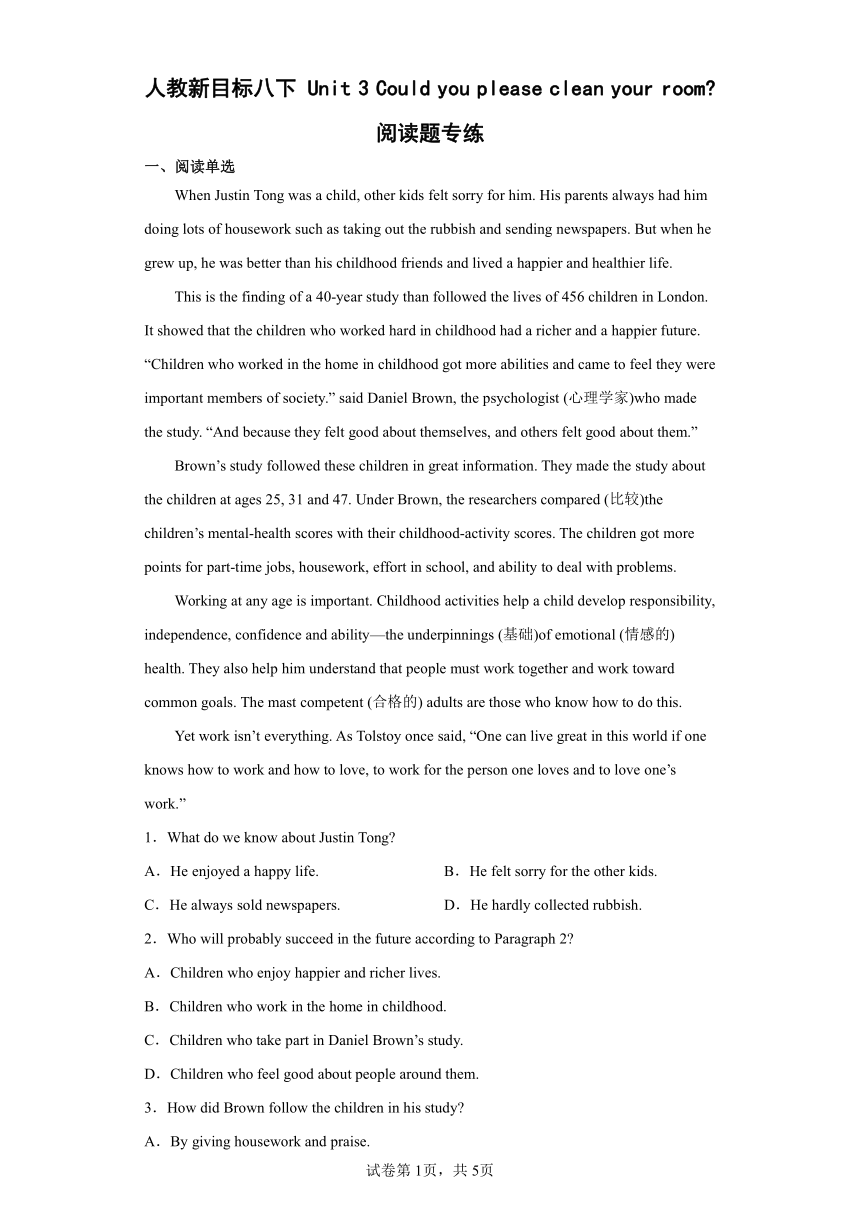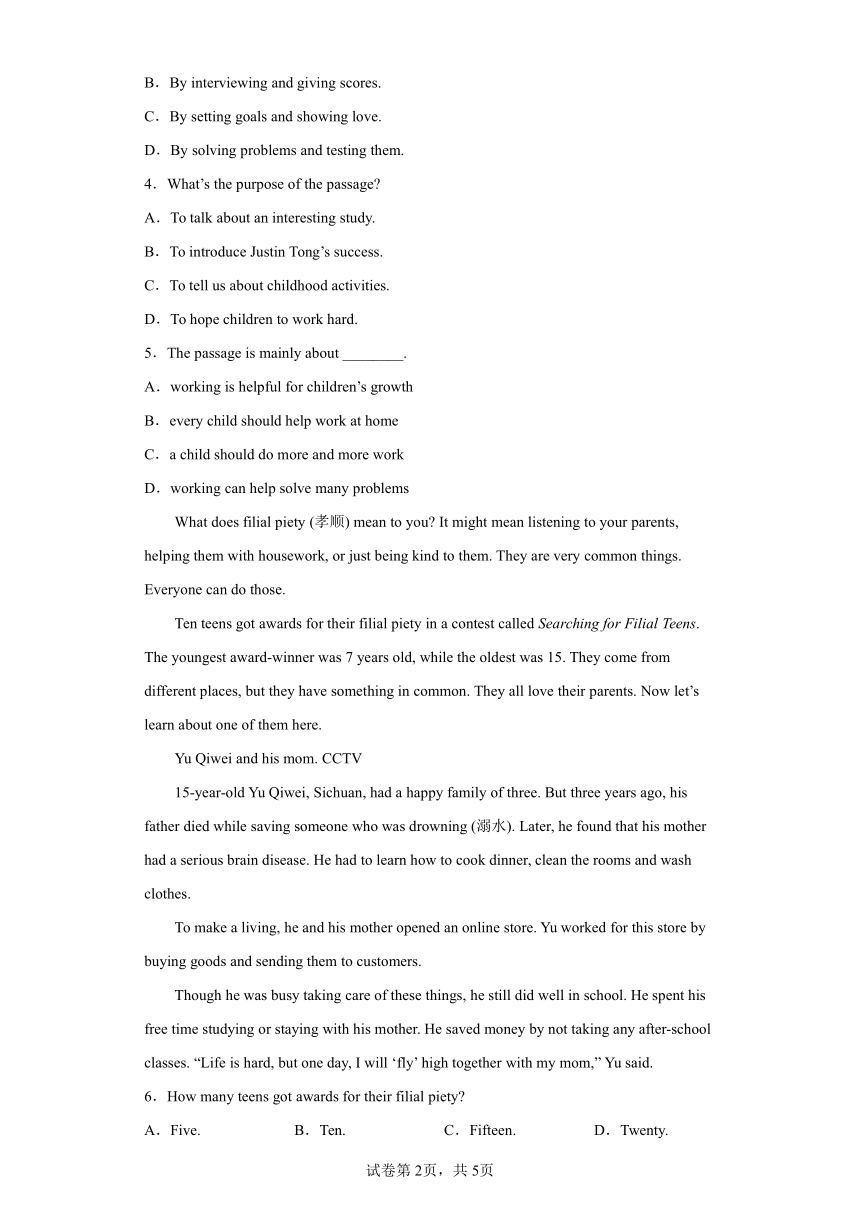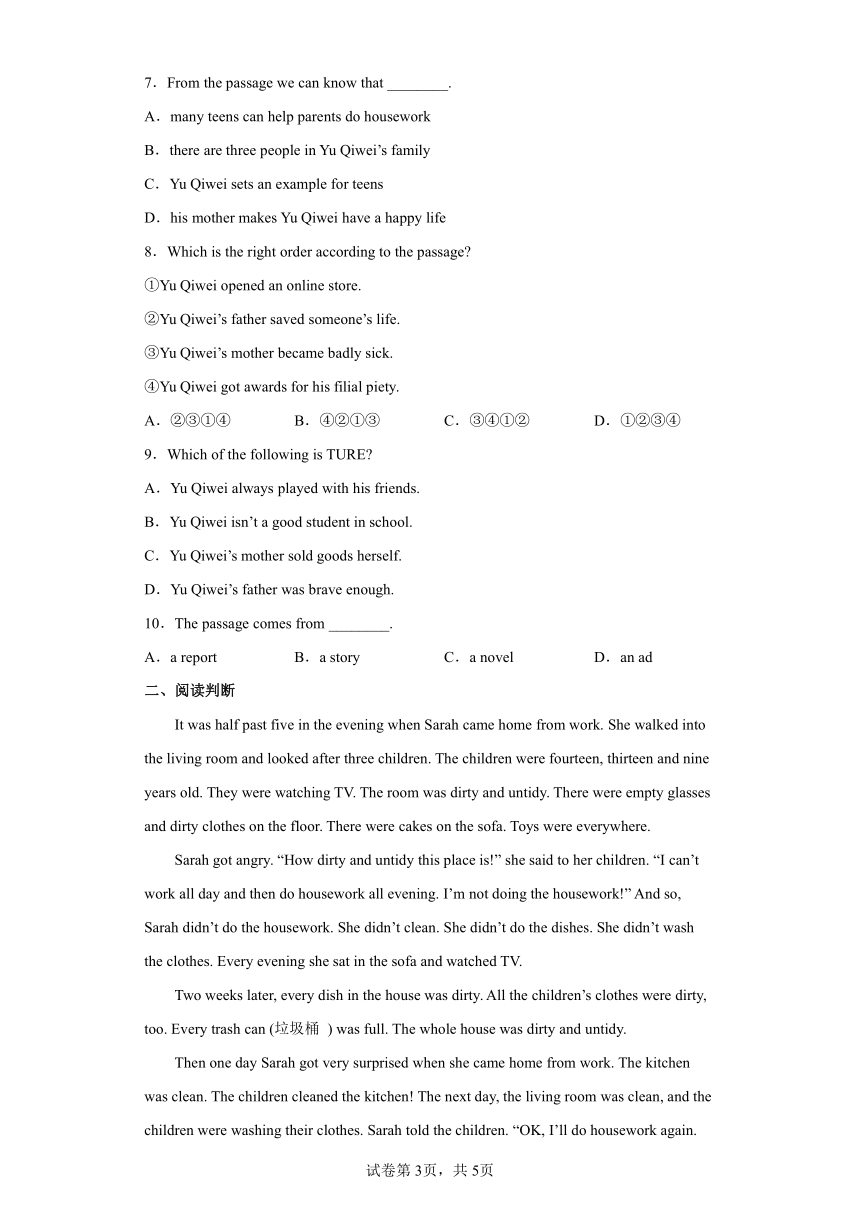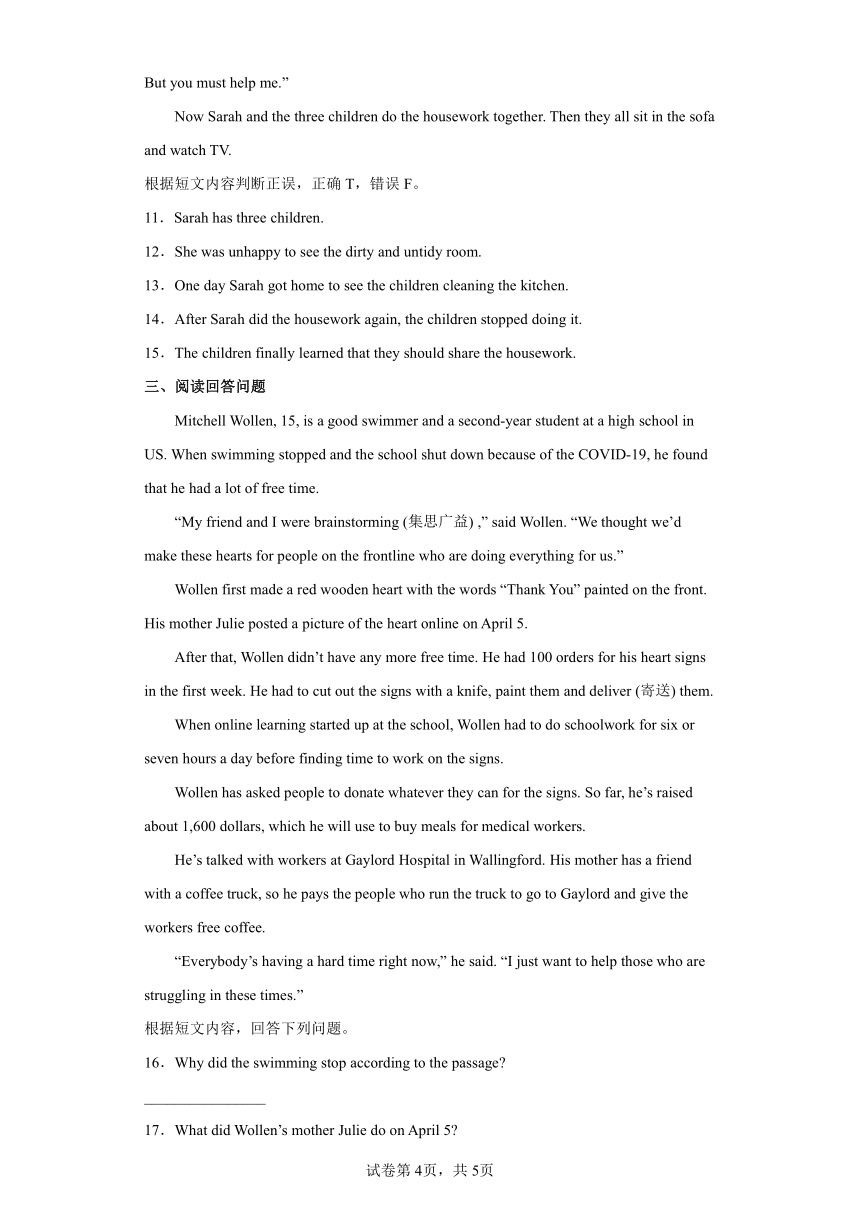Unit 3 Could you please clean your room? 阅读题专练(含答案)
文档属性
| 名称 | Unit 3 Could you please clean your room? 阅读题专练(含答案) |  | |
| 格式 | docx | ||
| 文件大小 | 22.0KB | ||
| 资源类型 | 教案 | ||
| 版本资源 | 人教新目标(Go for it)版 | ||
| 科目 | 英语 | ||
| 更新时间 | 2022-03-08 16:59:42 | ||
图片预览




文档简介
人教新目标八下 Unit 3 Could you please clean your room 阅读题专练
一、阅读单选
When Justin Tong was a child, other kids felt sorry for him. His parents always had him doing lots of housework such as taking out the rubbish and sending newspapers. But when he grew up, he was better than his childhood friends and lived a happier and healthier life.
This is the finding of a 40-year study than followed the lives of 456 children in London. It showed that the children who worked hard in childhood had a richer and a happier future. “Children who worked in the home in childhood got more abilities and came to feel they were important members of society.” said Daniel Brown, the psychologist (心理学家)who made the study. “And because they felt good about themselves, and others felt good about them.”
Brown’s study followed these children in great information. They made the study about the children at ages 25, 31 and 47. Under Brown, the researchers compared (比较)the children’s mental-health scores with their childhood-activity scores. The children got more points for part-time jobs, housework, effort in school, and ability to deal with problems.
Working at any age is important. Childhood activities help a child develop responsibility, independence, confidence and ability—the underpinnings (基础)of emotional (情感的) health. They also help him understand that people must work together and work toward common goals. The mast competent (合格的) adults are those who know how to do this.
Yet work isn’t everything. As Tolstoy once said, “One can live great in this world if one knows how to work and how to love, to work for the person one loves and to love one’s work.”
1.What do we know about Justin Tong
A.He enjoyed a happy life. B.He felt sorry for the other kids.
C.He always sold newspapers. D.He hardly collected rubbish.
2.Who will probably succeed in the future according to Paragraph 2
A.Children who enjoy happier and richer lives.
B.Children who work in the home in childhood.
C.Children who take part in Daniel Brown’s study.
D.Children who feel good about people around them.
3.How did Brown follow the children in his study
A.By giving housework and praise.
B.By interviewing and giving scores.
C.By setting goals and showing love.
D.By solving problems and testing them.
4.What’s the purpose of the passage
A.To talk about an interesting study.
B.To introduce Justin Tong’s success.
C.To tell us about childhood activities.
D.To hope children to work hard.
5.The passage is mainly about ________.
A.working is helpful for children’s growth
B.every child should help work at home
C.a child should do more and more work
D.working can help solve many problems
What does filial piety (孝顺) mean to you It might mean listening to your parents, helping them with housework, or just being kind to them. They are very common things. Everyone can do those.
Ten teens got awards for their filial piety in a contest called Searching for Filial Teens. The youngest award-winner was 7 years old, while the oldest was 15. They come from different places, but they have something in common. They all love their parents. Now let’s learn about one of them here.
Yu Qiwei and his mom. CCTV
15-year-old Yu Qiwei, Sichuan, had a happy family of three. But three years ago, his father died while saving someone who was drowning (溺水). Later, he found that his mother had a serious brain disease. He had to learn how to cook dinner, clean the rooms and wash clothes.
To make a living, he and his mother opened an online store. Yu worked for this store by buying goods and sending them to customers.
Though he was busy taking care of these things, he still did well in school. He spent his free time studying or staying with his mother. He saved money by not taking any after-school classes. “Life is hard, but one day, I will ‘fly’ high together with my mom,” Yu said.
6.How many teens got awards for their filial piety
A.Five. B.Ten. C.Fifteen. D.Twenty.
7.From the passage we can know that ________.
A.many teens can help parents do housework
B.there are three people in Yu Qiwei’s family
C.Yu Qiwei sets an example for teens
D.his mother makes Yu Qiwei have a happy life
8.Which is the right order according to the passage
①Yu Qiwei opened an online store.
②Yu Qiwei’s father saved someone’s life.
③Yu Qiwei’s mother became badly sick.
④Yu Qiwei got awards for his filial piety.
A.②③①④ B.④②①③ C.③④①② D.①②③④
9.Which of the following is TURE
A.Yu Qiwei always played with his friends.
B.Yu Qiwei isn’t a good student in school.
C.Yu Qiwei’s mother sold goods herself.
D.Yu Qiwei’s father was brave enough.
10.The passage comes from ________.
A.a report B.a story C.a novel D.an ad
二、阅读判断
It was half past five in the evening when Sarah came home from work. She walked into the living room and looked after three children. The children were fourteen, thirteen and nine years old. They were watching TV. The room was dirty and untidy. There were empty glasses and dirty clothes on the floor. There were cakes on the sofa. Toys were everywhere.
Sarah got angry. “How dirty and untidy this place is!” she said to her children. “I can’t work all day and then do housework all evening. I’m not doing the housework!” And so, Sarah didn’t do the housework. She didn’t clean. She didn’t do the dishes. She didn’t wash the clothes. Every evening she sat in the sofa and watched TV.
Two weeks later, every dish in the house was dirty. All the children’s clothes were dirty, too. Every trash can (垃圾桶 ) was full. The whole house was dirty and untidy.
Then one day Sarah got very surprised when she came home from work. The kitchen was clean. The children cleaned the kitchen! The next day, the living room was clean, and the children were washing their clothes. Sarah told the children. “OK, I’ll do housework again. But you must help me.”
Now Sarah and the three children do the housework together. Then they all sit in the sofa and watch TV.
根据短文内容判断正误,正确T,错误F。
11.Sarah has three children.
12.She was unhappy to see the dirty and untidy room.
13.One day Sarah got home to see the children cleaning the kitchen.
14.After Sarah did the housework again, the children stopped doing it.
15.The children finally learned that they should share the housework.
三、阅读回答问题
Mitchell Wollen, 15, is a good swimmer and a second-year student at a high school in US. When swimming stopped and the school shut down because of the COVID-19, he found that he had a lot of free time.
“My friend and I were brainstorming (集思广益) ,” said Wollen. “We thought we’d make these hearts for people on the frontline who are doing everything for us.”
Wollen first made a red wooden heart with the words “Thank You” painted on the front. His mother Julie posted a picture of the heart online on April 5.
After that, Wollen didn’t have any more free time. He had 100 orders for his heart signs in the first week. He had to cut out the signs with a knife, paint them and deliver (寄送) them.
When online learning started up at the school, Wollen had to do schoolwork for six or seven hours a day before finding time to work on the signs.
Wollen has asked people to donate whatever they can for the signs. So far, he’s raised about 1,600 dollars, which he will use to buy meals for medical workers.
He’s talked with workers at Gaylord Hospital in Wallingford. His mother has a friend with a coffee truck, so he pays the people who run the truck to go to Gaylord and give the workers free coffee.
“Everybody’s having a hard time right now,” he said. “I just want to help those who are struggling in these times.”
根据短文内容,回答下列问题。
16.Why did the swimming stop according to the passage
________________
17.What did Wollen’s mother Julie do on April 5
________________
18.How many orders did Wollen have in the first week
________________
19.How long did Wollen have to do schoolwork a day
________________
20.Who did Wollen buy meals for
________________
试卷第1页,共3页
试卷第1页,共3页
参考答案:
1.A
2.B
3.B
4.D
5.A
【解析】
【分析】
这是一篇议论文,文章讲述从小做家务的孩子会有较强的责任感、独立、自信以及其他的能力,这些人更能建立更好的人际关系、获得丰厚的收入以及解决问题的能力。
1.
细节理解题。根据第一段“But when he grew up, he was better off than his childhood friends and lived a happier and healthier life ”可是当他长大的时候,他比他儿时的玩伴好多了,过着幸福而又健康的生活。可知他享受着幸福的生活。故选A。
2.
推理判断题。根据第二段“Children who worked in the home or community gained competence and came to feel they were worthwhile members of society”那些在家里或社区工作的男孩子们获得了能力,逐渐感到他们是有价值的社会成员;及“It showed that the children who had worked hard in childhood had a richer and a happier future”这表明在童年时期努力工作的孩子有更丰富的并且幸福的未来,可知,那些在家里的男孩子们很可能赢在未来。故选B。
3.
推理判断题。根据第三段“the researchers compared the children’s mental﹣health scores with their childhood-activity scores”研究人员将儿童的心理健康评分与儿童活动评分进行了比较,可知通过面试访谈和打分来跟踪研究那些孩子们。故选B。
4.
推理判断题。根据“It showed that the children who had worked hard in childhood had a richer and a happier future”这表明在童年时期努力工作的孩子有更丰富的并且幸福的未来,可知,文章的目的在于鼓励孩子们努力工作。故选D。
5.
主旨大意题。文章讲述从小做家务的孩子长大后各个方面都比较优秀,会有较强的责任感、独立、自信以及其他的能力,这些人更能建立更好的人际关系、获得丰厚的收入以及解决问题的能力。主旨可概括为“working is helpful for children’s growth工作对于孩子的成长是有帮助的”。故选A。
6.B
7.C
8.A
9.D
10.A
【解析】
【分析】
这是一篇新闻报道,文章讲述在一场名为“寻找孝顺青少年”的比赛中,10名青少年因孝顺而获奖。最年轻的获奖者7岁,最大的15岁。他们来自不同的地方,但有一个共同点:他们都爱他们的父母。文章主要讲述了于琪巍和他妈妈的故事。
6.
细节理解题。根据第二段“Ten teens got awards for their filial piety”可知10名青少年因孝顺而获奖。故选B。
7.
推理判断题。根据“They all love their parents. Now let’s learn about one of them here”他们都爱他们的父母,文章举的例子只是他们其中的一个。可知于琪巍为青少年树立了榜样。故选C。
8.
推理判断题。根据“ his father died while saving someone who was drowning”于琪巍的父亲因救人失去了生命;“he found that his mother had a serious brain disease”母亲被查出得了严重的脑部疾病;“To make a living, he and his mother opened an online store”为了生活,于琪巍和母亲开了网店;“got awards for their filial piety ”最后因孝顺而获奖。正确顺序为②③①④。故选A。
9.
推理判断题。根据第四段“But three years ago, his father died while saving someone who was drowning”三年前,他的父亲救溺水的人而去世了,可推断于琪巍的父亲很勇敢。D选项表述准确。故选D。
10.
推理判断题。根据“CCTV”可知,本文属于一篇报道。故选A。
11.T
12.T
13.F
14.F
15.T
【解析】
【分析】
短文大意:短文讲述了孩子们的转变。母亲萨拉通过不做家务让家里变得脏乱不堪,倒逼着三个孩子一改懒惰成性的毛病做起了家务,帮助孩子们明白了应该分担家务的道理。
11.题意:萨拉有三个孩子。考查细节判断。根据“She walked into the living room and looked after three children她走进客厅,照顾三个孩子”,可知说法正确,故选T。
12.题意:她看到又脏又乱的房间很不高兴。考查细节判断。根据第二段开头“Sarah got angry莎拉生气了”,可知说法正确,故选T。
13.题意:一天,萨拉回家看到孩子们在打扫厨房。考查细节判断。根据“Then one day Sarah got very surprised when she came home from work. The kitchen was clean” 有一天,萨拉下班回家,感到非常惊讶。厨房很干净。孩子们打扫了厨房,可知孩子们在妈妈回家前打扫了厨房,说法错误,故选F。
14.题意:萨拉再次做家务后,孩子们就不再做了。考查细节判断。根据“Now Sarah and the three children do the housework together现在萨拉和三个孩子一起做家务”,可知说法错误,故选F。
15.题意:孩子们终于明白他们应该分担家务。考查细节判断。根据短文中孩子们的变化,结合最后“Now Sarah and the three children do the housework together现在萨拉和三个孩子一起做家务”,可知说法正确,故选T。
【点睛】
阅读判断,需要根据文章的表层意思进行深层次的推理,判断说法正确与否。首先要粗读文章了解大意,其次通过细读,理解全文。在粗读的基础上,仔细阅读题后所给的题目,根据题目要求,再有重点地返回来仔细阅读。在阅读时要注意辨认和记忆具体事实,重要情节,事物的起因、过程、结果及发生的地点、时间等,这对题目的判断至关重要,需要考生综合所有的细节来理解把握。例如小题1,判断“萨拉有三个孩子”是否正确。根据“She walked into the living room and looked after three children她走进客厅,照顾三个孩子”,可知说法正确,故选T。
16.Because of the COVID-19.
17.She posted a picture of the heart online.
18.100/One hundred.
19.For six or seven hours.
20.Medical workers.
【解析】
【分析】
文章主要讲述了米切尔利用空闲时间做带有“Thank you”的心形标志牌,在网上出售,并把所得的钱给医护人员买食物。
16.
根据第一段“When swimming stopped and the school shut down because of the COVID-19”可知,停止游泳是因为新冠肺炎。故填Because of the COVID-19.
17.
根据第三段“His mother Julie posted a picture of the heart online on April 5”可知,他妈妈在网上发布了这张心形照片。故填She posted a picture of the heart online.
18.
根据第四段“He had 100 orders for his heart signs in the first week”可知,在第一周他有100个订单。故填100/One hundred.
19.
根据第五段“Wollen had to do schoolwork for six or seven hours a day”可知,他每天做六个小时或七个小时的功课。故填For six or seven hours.
20.
根据第六段“So far, he’s raised about 1,600 dollars, which he will use to buy meals for medical workers”可知,他给医务人员买餐食。故填Medical workers.
答案第1页,共2页
答案第1页,共2页
一、阅读单选
When Justin Tong was a child, other kids felt sorry for him. His parents always had him doing lots of housework such as taking out the rubbish and sending newspapers. But when he grew up, he was better than his childhood friends and lived a happier and healthier life.
This is the finding of a 40-year study than followed the lives of 456 children in London. It showed that the children who worked hard in childhood had a richer and a happier future. “Children who worked in the home in childhood got more abilities and came to feel they were important members of society.” said Daniel Brown, the psychologist (心理学家)who made the study. “And because they felt good about themselves, and others felt good about them.”
Brown’s study followed these children in great information. They made the study about the children at ages 25, 31 and 47. Under Brown, the researchers compared (比较)the children’s mental-health scores with their childhood-activity scores. The children got more points for part-time jobs, housework, effort in school, and ability to deal with problems.
Working at any age is important. Childhood activities help a child develop responsibility, independence, confidence and ability—the underpinnings (基础)of emotional (情感的) health. They also help him understand that people must work together and work toward common goals. The mast competent (合格的) adults are those who know how to do this.
Yet work isn’t everything. As Tolstoy once said, “One can live great in this world if one knows how to work and how to love, to work for the person one loves and to love one’s work.”
1.What do we know about Justin Tong
A.He enjoyed a happy life. B.He felt sorry for the other kids.
C.He always sold newspapers. D.He hardly collected rubbish.
2.Who will probably succeed in the future according to Paragraph 2
A.Children who enjoy happier and richer lives.
B.Children who work in the home in childhood.
C.Children who take part in Daniel Brown’s study.
D.Children who feel good about people around them.
3.How did Brown follow the children in his study
A.By giving housework and praise.
B.By interviewing and giving scores.
C.By setting goals and showing love.
D.By solving problems and testing them.
4.What’s the purpose of the passage
A.To talk about an interesting study.
B.To introduce Justin Tong’s success.
C.To tell us about childhood activities.
D.To hope children to work hard.
5.The passage is mainly about ________.
A.working is helpful for children’s growth
B.every child should help work at home
C.a child should do more and more work
D.working can help solve many problems
What does filial piety (孝顺) mean to you It might mean listening to your parents, helping them with housework, or just being kind to them. They are very common things. Everyone can do those.
Ten teens got awards for their filial piety in a contest called Searching for Filial Teens. The youngest award-winner was 7 years old, while the oldest was 15. They come from different places, but they have something in common. They all love their parents. Now let’s learn about one of them here.
Yu Qiwei and his mom. CCTV
15-year-old Yu Qiwei, Sichuan, had a happy family of three. But three years ago, his father died while saving someone who was drowning (溺水). Later, he found that his mother had a serious brain disease. He had to learn how to cook dinner, clean the rooms and wash clothes.
To make a living, he and his mother opened an online store. Yu worked for this store by buying goods and sending them to customers.
Though he was busy taking care of these things, he still did well in school. He spent his free time studying or staying with his mother. He saved money by not taking any after-school classes. “Life is hard, but one day, I will ‘fly’ high together with my mom,” Yu said.
6.How many teens got awards for their filial piety
A.Five. B.Ten. C.Fifteen. D.Twenty.
7.From the passage we can know that ________.
A.many teens can help parents do housework
B.there are three people in Yu Qiwei’s family
C.Yu Qiwei sets an example for teens
D.his mother makes Yu Qiwei have a happy life
8.Which is the right order according to the passage
①Yu Qiwei opened an online store.
②Yu Qiwei’s father saved someone’s life.
③Yu Qiwei’s mother became badly sick.
④Yu Qiwei got awards for his filial piety.
A.②③①④ B.④②①③ C.③④①② D.①②③④
9.Which of the following is TURE
A.Yu Qiwei always played with his friends.
B.Yu Qiwei isn’t a good student in school.
C.Yu Qiwei’s mother sold goods herself.
D.Yu Qiwei’s father was brave enough.
10.The passage comes from ________.
A.a report B.a story C.a novel D.an ad
二、阅读判断
It was half past five in the evening when Sarah came home from work. She walked into the living room and looked after three children. The children were fourteen, thirteen and nine years old. They were watching TV. The room was dirty and untidy. There were empty glasses and dirty clothes on the floor. There were cakes on the sofa. Toys were everywhere.
Sarah got angry. “How dirty and untidy this place is!” she said to her children. “I can’t work all day and then do housework all evening. I’m not doing the housework!” And so, Sarah didn’t do the housework. She didn’t clean. She didn’t do the dishes. She didn’t wash the clothes. Every evening she sat in the sofa and watched TV.
Two weeks later, every dish in the house was dirty. All the children’s clothes were dirty, too. Every trash can (垃圾桶 ) was full. The whole house was dirty and untidy.
Then one day Sarah got very surprised when she came home from work. The kitchen was clean. The children cleaned the kitchen! The next day, the living room was clean, and the children were washing their clothes. Sarah told the children. “OK, I’ll do housework again. But you must help me.”
Now Sarah and the three children do the housework together. Then they all sit in the sofa and watch TV.
根据短文内容判断正误,正确T,错误F。
11.Sarah has three children.
12.She was unhappy to see the dirty and untidy room.
13.One day Sarah got home to see the children cleaning the kitchen.
14.After Sarah did the housework again, the children stopped doing it.
15.The children finally learned that they should share the housework.
三、阅读回答问题
Mitchell Wollen, 15, is a good swimmer and a second-year student at a high school in US. When swimming stopped and the school shut down because of the COVID-19, he found that he had a lot of free time.
“My friend and I were brainstorming (集思广益) ,” said Wollen. “We thought we’d make these hearts for people on the frontline who are doing everything for us.”
Wollen first made a red wooden heart with the words “Thank You” painted on the front. His mother Julie posted a picture of the heart online on April 5.
After that, Wollen didn’t have any more free time. He had 100 orders for his heart signs in the first week. He had to cut out the signs with a knife, paint them and deliver (寄送) them.
When online learning started up at the school, Wollen had to do schoolwork for six or seven hours a day before finding time to work on the signs.
Wollen has asked people to donate whatever they can for the signs. So far, he’s raised about 1,600 dollars, which he will use to buy meals for medical workers.
He’s talked with workers at Gaylord Hospital in Wallingford. His mother has a friend with a coffee truck, so he pays the people who run the truck to go to Gaylord and give the workers free coffee.
“Everybody’s having a hard time right now,” he said. “I just want to help those who are struggling in these times.”
根据短文内容,回答下列问题。
16.Why did the swimming stop according to the passage
________________
17.What did Wollen’s mother Julie do on April 5
________________
18.How many orders did Wollen have in the first week
________________
19.How long did Wollen have to do schoolwork a day
________________
20.Who did Wollen buy meals for
________________
试卷第1页,共3页
试卷第1页,共3页
参考答案:
1.A
2.B
3.B
4.D
5.A
【解析】
【分析】
这是一篇议论文,文章讲述从小做家务的孩子会有较强的责任感、独立、自信以及其他的能力,这些人更能建立更好的人际关系、获得丰厚的收入以及解决问题的能力。
1.
细节理解题。根据第一段“But when he grew up, he was better off than his childhood friends and lived a happier and healthier life ”可是当他长大的时候,他比他儿时的玩伴好多了,过着幸福而又健康的生活。可知他享受着幸福的生活。故选A。
2.
推理判断题。根据第二段“Children who worked in the home or community gained competence and came to feel they were worthwhile members of society”那些在家里或社区工作的男孩子们获得了能力,逐渐感到他们是有价值的社会成员;及“It showed that the children who had worked hard in childhood had a richer and a happier future”这表明在童年时期努力工作的孩子有更丰富的并且幸福的未来,可知,那些在家里的男孩子们很可能赢在未来。故选B。
3.
推理判断题。根据第三段“the researchers compared the children’s mental﹣health scores with their childhood-activity scores”研究人员将儿童的心理健康评分与儿童活动评分进行了比较,可知通过面试访谈和打分来跟踪研究那些孩子们。故选B。
4.
推理判断题。根据“It showed that the children who had worked hard in childhood had a richer and a happier future”这表明在童年时期努力工作的孩子有更丰富的并且幸福的未来,可知,文章的目的在于鼓励孩子们努力工作。故选D。
5.
主旨大意题。文章讲述从小做家务的孩子长大后各个方面都比较优秀,会有较强的责任感、独立、自信以及其他的能力,这些人更能建立更好的人际关系、获得丰厚的收入以及解决问题的能力。主旨可概括为“working is helpful for children’s growth工作对于孩子的成长是有帮助的”。故选A。
6.B
7.C
8.A
9.D
10.A
【解析】
【分析】
这是一篇新闻报道,文章讲述在一场名为“寻找孝顺青少年”的比赛中,10名青少年因孝顺而获奖。最年轻的获奖者7岁,最大的15岁。他们来自不同的地方,但有一个共同点:他们都爱他们的父母。文章主要讲述了于琪巍和他妈妈的故事。
6.
细节理解题。根据第二段“Ten teens got awards for their filial piety”可知10名青少年因孝顺而获奖。故选B。
7.
推理判断题。根据“They all love their parents. Now let’s learn about one of them here”他们都爱他们的父母,文章举的例子只是他们其中的一个。可知于琪巍为青少年树立了榜样。故选C。
8.
推理判断题。根据“ his father died while saving someone who was drowning”于琪巍的父亲因救人失去了生命;“he found that his mother had a serious brain disease”母亲被查出得了严重的脑部疾病;“To make a living, he and his mother opened an online store”为了生活,于琪巍和母亲开了网店;“got awards for their filial piety ”最后因孝顺而获奖。正确顺序为②③①④。故选A。
9.
推理判断题。根据第四段“But three years ago, his father died while saving someone who was drowning”三年前,他的父亲救溺水的人而去世了,可推断于琪巍的父亲很勇敢。D选项表述准确。故选D。
10.
推理判断题。根据“CCTV”可知,本文属于一篇报道。故选A。
11.T
12.T
13.F
14.F
15.T
【解析】
【分析】
短文大意:短文讲述了孩子们的转变。母亲萨拉通过不做家务让家里变得脏乱不堪,倒逼着三个孩子一改懒惰成性的毛病做起了家务,帮助孩子们明白了应该分担家务的道理。
11.题意:萨拉有三个孩子。考查细节判断。根据“She walked into the living room and looked after three children她走进客厅,照顾三个孩子”,可知说法正确,故选T。
12.题意:她看到又脏又乱的房间很不高兴。考查细节判断。根据第二段开头“Sarah got angry莎拉生气了”,可知说法正确,故选T。
13.题意:一天,萨拉回家看到孩子们在打扫厨房。考查细节判断。根据“Then one day Sarah got very surprised when she came home from work. The kitchen was clean” 有一天,萨拉下班回家,感到非常惊讶。厨房很干净。孩子们打扫了厨房,可知孩子们在妈妈回家前打扫了厨房,说法错误,故选F。
14.题意:萨拉再次做家务后,孩子们就不再做了。考查细节判断。根据“Now Sarah and the three children do the housework together现在萨拉和三个孩子一起做家务”,可知说法错误,故选F。
15.题意:孩子们终于明白他们应该分担家务。考查细节判断。根据短文中孩子们的变化,结合最后“Now Sarah and the three children do the housework together现在萨拉和三个孩子一起做家务”,可知说法正确,故选T。
【点睛】
阅读判断,需要根据文章的表层意思进行深层次的推理,判断说法正确与否。首先要粗读文章了解大意,其次通过细读,理解全文。在粗读的基础上,仔细阅读题后所给的题目,根据题目要求,再有重点地返回来仔细阅读。在阅读时要注意辨认和记忆具体事实,重要情节,事物的起因、过程、结果及发生的地点、时间等,这对题目的判断至关重要,需要考生综合所有的细节来理解把握。例如小题1,判断“萨拉有三个孩子”是否正确。根据“She walked into the living room and looked after three children她走进客厅,照顾三个孩子”,可知说法正确,故选T。
16.Because of the COVID-19.
17.She posted a picture of the heart online.
18.100/One hundred.
19.For six or seven hours.
20.Medical workers.
【解析】
【分析】
文章主要讲述了米切尔利用空闲时间做带有“Thank you”的心形标志牌,在网上出售,并把所得的钱给医护人员买食物。
16.
根据第一段“When swimming stopped and the school shut down because of the COVID-19”可知,停止游泳是因为新冠肺炎。故填Because of the COVID-19.
17.
根据第三段“His mother Julie posted a picture of the heart online on April 5”可知,他妈妈在网上发布了这张心形照片。故填She posted a picture of the heart online.
18.
根据第四段“He had 100 orders for his heart signs in the first week”可知,在第一周他有100个订单。故填100/One hundred.
19.
根据第五段“Wollen had to do schoolwork for six or seven hours a day”可知,他每天做六个小时或七个小时的功课。故填For six or seven hours.
20.
根据第六段“So far, he’s raised about 1,600 dollars, which he will use to buy meals for medical workers”可知,他给医务人员买餐食。故填Medical workers.
答案第1页,共2页
答案第1页,共2页
同课章节目录
- Unit 1 What's the matter?
- Section A
- Section B
- Unit 2 I'll help to clean up the city parks.
- Section A
- Section B
- Unit 3 Could you please clean your room?
- Section A
- Section B
- Unit 4 Why don't you talk to your parents?
- Section A
- Section B
- Unit 5 What were you doing when the rainstorm came
- Section A
- Section B
- Review of Units 1-5
- Unit 6 An old man tried to move the mountains.
- Section A
- Section B
- Unit 7 What's the highest mountain in the world?
- Section A
- Section B
- Unit 8 Have you read Treasure Island yet?
- Section A
- Section B
- Unit 9 Have you ever been to a museum?
- Section A
- Section B
- Unit 10 I've had this bike for three years.
- Section A
- Section B
